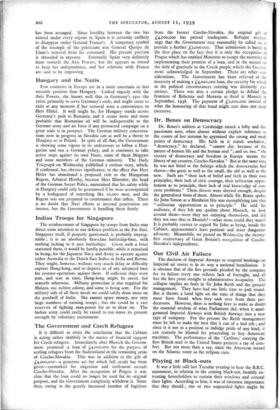Dr. Benes on Democracy
Dr. Benes's address at Cambridge struck a lofty and dis- passionate note, when almost without explicit reference to the events of last autumn he appraised the strong and weak points of democracy. His faith in it stands unshaken ; "democracy," he declared, "cannot die, because of the nature of human life and the human soul "; and so, too, "the victory of democracy and freedom in Europe means the liberty of my country, Czecho-Slovakia." But at the same time he was not blind to the failings which the democracies had shown—the great as well as the small, the old as well as the new. Such are "their lack of belief and faith in their own principles, their lack of civic courage, their utilitarian oppor- tunism as to principle, their lack of real knowledge of con- crete problems." These thrusts were shrewd enough, despite the generalised form of them. Almost while Dr. Benes spoke, Sir John Simon at a Blenheim fête was exemplifying just that "utilitarian opportunism as to principle." He told his audience, if they felt any qualms about Munich, to look around them—were they not enjoying themselves, and did they not owe that to Munich?—what more could they want? It is probably correct to regard Sir John as being, inside the Cabinet, appeasement's least penitent and most dangerous advocate. Meanwhile, we passed on Wednesday the twenty- first anniversary of Great Britain's recognition of Czecho- Slovakia's independence.








































 Previous page
Previous page